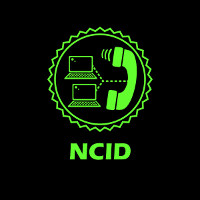A Client-Server-Gateway Caller ID System

Description
NCID is a Client/Gateway/Server Network Caller ID Package.
NCID Server
The NCID server, called ncidd, obtains Caller ID information or outgoing call information and makes it available to clients over the network.
The NCID server provides the calling number unformatted and formatted for the country where the server is located.
The NCID server can:
Use aliases to change the NUMBER or NAME received, before sending the call information to its clients.
Send messages to its clients. The messages are either from clients or alert messages from the server itself.
Automatically hangup up on unwanted calls using either the internal hangup or a hangup extension. The internal hangup uses the blacklist and whitelist files. The hangup extension uses the whitelist file but not the blacklist file. It allows you to customize how the hangup information is obtained, for example, using an Internet site or another blacklist file.
Modify the alias, blacklist and whitelist files with information obtained from the NCID client.
Function without Caller ID if a modem is used that indicates ring. The date and time of the call will be noted, but not the name or number of the caller.
The NCID server obtains the Caller ID information from modems, serial devices, and/or gateways. A SIP gateway obtains The Caller ID information for incoming calls and information on outgoing calls. If the hardware or gateway supports outgoing calls, ncidd can also send that information to its clients
Multiple gateways are supported and can be used with modems and/or serial devices.
NCID Server Hangup Extensions
NCID hangup extensions are programs or scripts called by ncidd to determine if it should hangup on a call. The caller number in ncidd.whitelist prevents ncidd from calling a hangup extension.
NCID gateways
A ncid gateway is a protocol converter. It converts a Caller ID message to a NCID format, a text message to a NCID message format, or converts a NCID Caller ID or text message into a format required by a client. There are multiple gateways.
NCID Universal Client
The NCID universal client, called ncid, normally displays the Caller ID or message and the Server Caller ID log, in a GUI window. The client can also display the Caller ID or message in a terminal window or send it to a output module or both.
There can be multiple clients in GUI or terminal window mode, but only one client per output module.
The NCID universal client in GUI mode can:
Configure the viewable collumns of caller information in its history window.
Request the server to dial either a user input number or dial a number from its history file.
Request the NCID server to pause automatic hangups for a user defined time up to 10 hours.
Send jobs to the server which can create, update, or delete an alias, create or delete entries from the blacklist or whitelist files and update the call file with new aliases.
NCID Universal Client Output Modules
The universal client output modules change how the client handles the Caller ID or message.
One module can send the CID to a cell phone, pager, or any email address.
Another can send the CID to any iOS or Android device and another can speak selected CID information.
There are other output modules, including ones that display the CID using MythTV: https://www.mythtv.org
Perfect for...
- Maintaining a list of telephone calls from one or more POTS lines, one or more VoIP systemsi and/or Android smart phones.
- Creating aliases for specific telephone calls, for example, 3215551550 becomes Nikola Tesla.
- Automatic hangup of unwanted calls.
- Displaying calls and messages on Android or iOS smart phones, cell phones using ncid-page that supports CMS or MMS, smart phones using ncid-notify, TV's, Computers and LCD/LED displays.